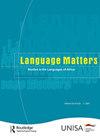Social Imperatives for Destination Language Learning
IF 0.8
3区 文学
0 LANGUAGE & LINGUISTICS
引用次数: 0
Abstract
Abstract The literature on language, immigration and the labour market mostly links destination language proficiency to higher earnings. Thus, it emphasises economic motivation for immigrants’ destination language learning. A questionnaire with open-ended and close- ended questions was used to survey 100 Ghanaian immigrants living in Johannesburg with regard to factors that stimulate or impede the learning of South African indigenous languages. The findings of this article affirm that economic migrants mostly learn destination languages for economic purposes. However, the study further revealed that social motivation is also important for immigrants’ language learning. Even though some of the participants successfully used English in their workplaces and other contexts, the established members of the host community’s preference for using South African indigenous languages for social purposes made the participants socially motivated to learn these languages. They later appreciated the social access and acceptance they gained through their proficiency.目的语言学习的社会必要性
关于语言、移民和劳动力市场的文献大多将目的地语言能力与更高的收入联系起来。因此,它强调了移民目的国语言学习的经济动机。采用一份带有开放式和封闭式问题的调查问卷,对居住在约翰内斯堡的100名加纳移民进行了关于促进或阻碍学习南非土著语言的因素的调查。本文的研究结果证实,经济移民主要是为了经济目的而学习目的地语言。然而,该研究进一步揭示了社会动机对移民的语言学习也很重要。尽管一些参与者成功地在工作场所和其他环境中使用英语,但东道国社区的既定成员倾向于在社交目的中使用南非土著语言,这使得参与者有学习这些语言的社会动机。后来,他们对自己的熟练程度所获得的社会准入和接受表示赞赏。
本文章由计算机程序翻译,如有差异,请以英文原文为准。
求助全文
约1分钟内获得全文
求助全文
来源期刊

Language Matters
Multiple-
CiteScore
1.20
自引率
0.00%
发文量
19
期刊介绍:
The purpose of Language Matters is to provide a journal of international standing with a unique African flavour focusing on multilingualism in Africa. Although the journal contributes to the language debate on all African languages, sub-Saharan Africa and issues related to multilingualism in the southern African context are the journal’s specific domains. The journal seeks to promote the dissemination of ideas, points of view, teaching strategies and research on different aspects of African languages, providing a forum for discussion on the whole spectrum of language usage and debate in Africa. The journal endorses a multidisciplinary approach to the study of language and welcomes contributions not only from sociolinguists, psycholinguists and the like, but also from educationalists, language practitioners, computer analysts, engineers or scholars with a genuine interest in and contribution to the study of language. All contributions are critically reviewed by at least two referees. Although the general focus remains on multilingualism and related issues, one of the three issues of Language Matters published each year is a special thematic edition on Language Politics in Africa. These special issues embrace a wide spectrum of language matters of current relevance in Southern Africa.
 求助内容:
求助内容: 应助结果提醒方式:
应助结果提醒方式:


